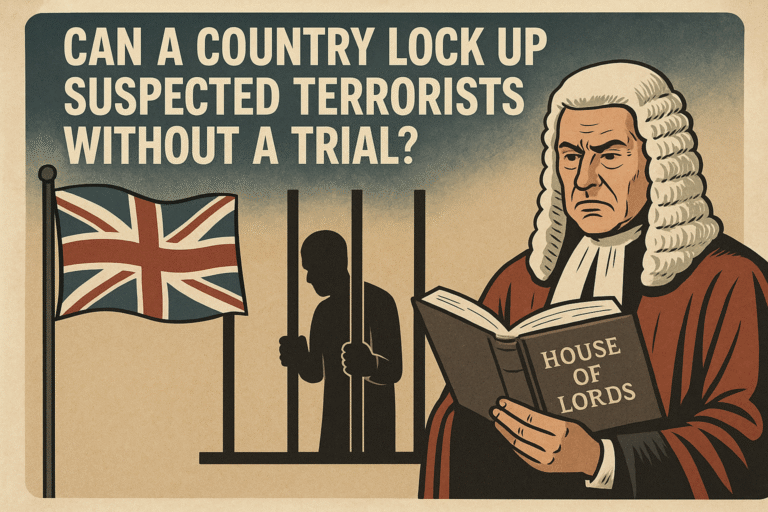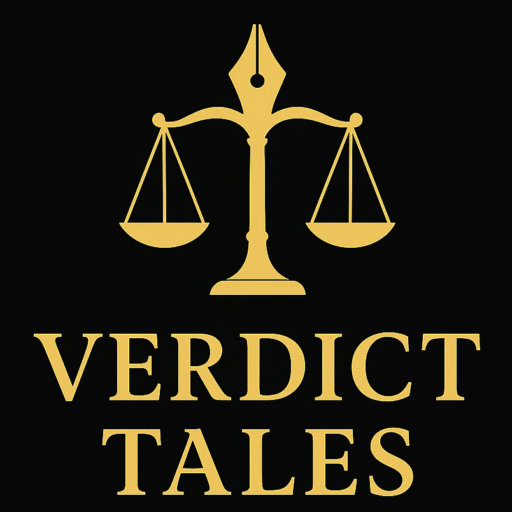The UK faced a terrifying conundrum in 2001:
how to defend its people against terrorism while still respecting human rights. Head-on addressing this conflict, the House of Lords decided in A v. Secretary of State for the Home Department ([2004] UKHL 56) on whether indefinite imprisonment of foreign individuals was legal. The court’s historic ruling shocked the legal system by changing the balance between liberty and security.
Background Case Details
Imagine waking up to learn that in one morning hundreds of people have been killed as planes collide with skyscrapers. Watching in horror as Al-Qaeda’s attacks on the United States set off hitherto unheard-of anxiety on September 11, 2001, was the globe. A close friend of the US, the UK saw the knock-on effects. Haunted by the prospect that such crimes might strike British territory, Prime Minister Tony Blair’s government hurried to react. Intelligence bulletins buzzed with warnings: foreign nationals living in the UK were suspected of links to Al-Qaeda, planning anarchy from within.
Now enter nine individuals whose lives would turn into a legal battlefield; they were all foreign nationals. These were average faces caught in an extraordinary storm, not renowned names. None were charged criminally, but under the Anti-terrorism, Crime and Security Act 2001 the Home Secretary labeled them “suspected international terrorists.” Eight were in custody without trial on December 19, 2001; a ninth was taken in February 2002. Locked in high-security prisons like Belmarsh Prison, they experienced indefinite detention—a legal twilight in which liberation felt far-off.
The case of the prosecution rested on intelligence, not evidence suitable for a court. With claimed ties to terrorist organizations, the men were accused of being hazards to national security. The twist is they were unable to be deported. Sending them back to their native countries ran the risk of torture, therefore breaching UK responsibilities under the European Convention on Human Rights (ECHR). Their confinement infuriated others—without charges, without trials, without a path out. Human rights organizations such as Liberty and Amnesty International protested, contending the men were imprisoned in a “prison with three walls,” free to leave only if another nation would take them—none of which did.
This tested the soul of the United Kingdom, not only a court matter. Following September 11th, fear engulfed Britain, yet its great history of liberty collided with the government’s austere approach. Nine legal giants would rule in the House of Lords whether the UK might compromise human rights in order to combat terrorism.
Legal Reactions
The path towards the House of Lords resembled a rollercoaster. First stop: a body intended to handle delicate matters involving national security, the Special Immigration Appeals Commission (SIAC). SIAC decided on July 30, 2002, that while the detention was legal, it was discriminatory. Under the 2001 Act, the Home Secretary could hold foreign people; SIAC discovered a flaw: British citizens posing identical dangers weren’t locked up. Article 14 of the ECHR forbids discrimination in enjoying Convention rights; hence this double standard breached that Article.
The government appealed to the Court of Appeal, which on October 25, 2002 turned the script around. Under Lord Woolf’s direction, the court maintained the detention, contending that foreign nationals were different—they might be deported should safe nations be discovered, unlike British residents with a right to stay. Supported by Liberty, the appellants pushed back, alleging their Article 5 ECHR right to liberty was violated and the law was unreasonable.
The legal conflict was fierce at the House of Lords. The counsel for the appellants contended that the UK’s ECHR departure—allowing imprisonment without trial—was void. Pointing out that no other European nation had taken such extreme action, they contested the government’s assertion of a “public emergency threatening the life of the nation.” Defending the Home Secretary, the Attorney General maintained the post-9/11 threat warranted the imprisonment. Intelligence, he said, revealed Al-Qaeda’s intention for attack, and the government was unable to wait for calamity to intervene.
The traditional sense of standing was not taken by witnesses. Rather, the argument focused on “closed material,” secret intelligence the detainees and their lawyers were blind to. Appointed to speak for the inmates, special advocates examined this material but were unable to share it with their clients. This sinister mechanism drove the appellants’ assertion that they were deprived of a fair opportunity to refute the accusations.
Ruling and Argument of the Court
The House of Lords shockingly deemed section 23 of the 2001 Act incompatible with the ECHR by an 8-1 majority on December 16, 2004, thereby negating the Derogation Order. A dramatic triumph for human rights, the detention powers were declared to be disproportionate and biased.
This explains why the Lords decided as they did:
• Article 15 of the ECHR permits only derogation if the emergency calls for “strictly required” measures. The Lords concluded that it was not necessary to hold foreign nationals under custody while allowing British suspects to go free. Why was it vital for foreigners if the government did not have to lock down British terrorists? The measures failed the test of proportionality.
• Article 14 assures equal enjoyment of Convention rights, thereby forbidding discrimination. The Lords decided that although both foreign and British suspects presented threats, only foreigners were detained—they were in “relevantly similar circumstances.” Based solely on nationality, this difference was unfair and biased.
Though most Lords agreed a national emergency occurred following 9/11, they closely examined the government’s reaction. Dissenting, Lord Hoffmann said no real emergency threatened the life of the country. Still, most concentrated on the excess of the measures rather than the existence of the emergency.
The 2001 Act undermined the idea that suspects were immediate threats by allowing incarceration of Basque separatists and those without Al-Qaeda ties to leave for other nations. This discrepancy compromised the rational link of the law to national security.
Although courts cannot overturn Acts of Parliament, the decision clearly indicated that the administration had overreached itself, not releasing the inmates right away. Parliament would have to change its strategy by juggling justice with security.
Lessons and Final Thought
The A v. Secretary of State decision is a master class in judicial bravery. It reminds us that the rule of law is uncompromising even in times of anxiety. For the police and intelligence services, this is a wake-up call: security policies have to be exact rather than hazy. Not only unfair but also useless is locking up foreigners while neglecting British dangers. The case emphasizes especially the authority of judicial review. SIAC and the courts were not slow in confronting the government to show that nobody is above the law.
Given that this issue concerns fairness, the typical reader will find resonance in it. Imagine being arrested not knowing why, unable to clear your identity, all because of your birthplace. The Lords’ ruling underlines that everyone has human rights, not only citizens. In trying circumstances, it is a lighthouse of hope demonstrating that democracy lives when justice rules.
This verdict changed the anti-terrorism rules in the United Kingdom. Later, Parliament replaced the detention authority with control orders, which covered all suspects irrespective of nationality. It is evidence of the court’s responsibility in ensuring that the government is under control so as to prevent freedom from being subordinated to fear.




